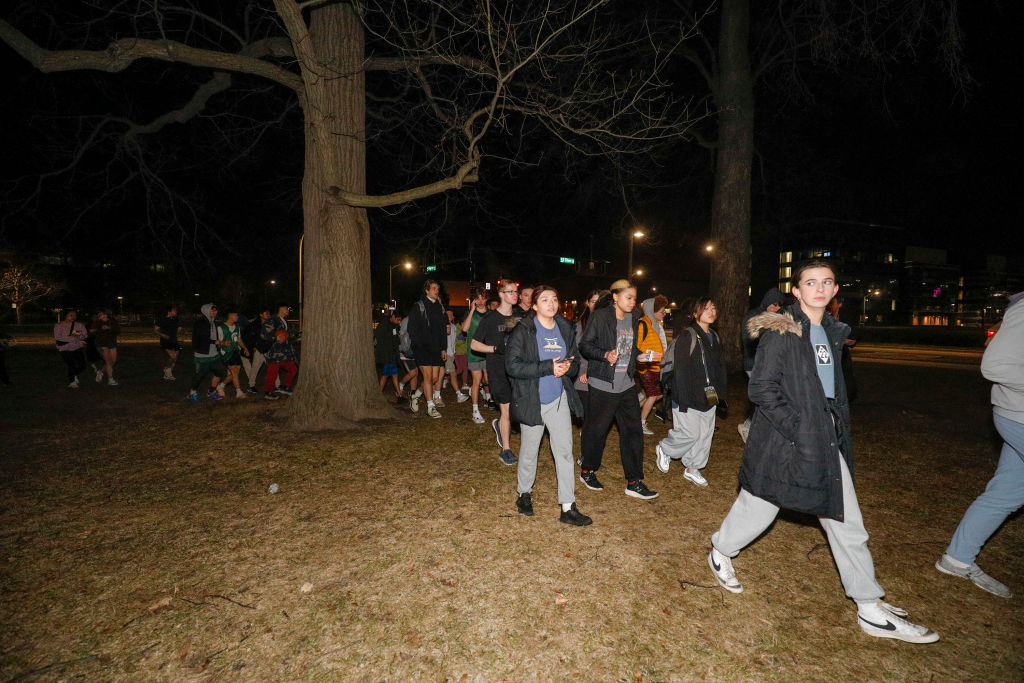For four hours on Monday night, as far as anybody knew, it wasn't safe to be on or near the campus of Michigan State University. At 8:40 p.m., police reported shots fired near Berkey Hall on the northern border of campus, across the street from the most bustling part of East Lansing. Official information was sparse in the aftermath. A reported shooting at 9:26, at a fitness center southeast of Berkey, turned out to be a false alarm. Shots at the nearby Student Union weren't. At 9:56, police released an infuriatingly vague description of a suspect said to be "a short male with a mask, possibly Black." At 11:18, an image of the suspect from a security camera was released. Finally, at 12:28 a.m., police announced that the man they were searching for had died by suicide.
This is a place where my younger brother very recently lived, where my parents went to a basketball game two weeks ago. It hit home. And in those four hours, I like probably millions of other Michiganders thought about Oxford High School, about 80 miles east of MSU. Those from outside the state probably wouldn't even remember it, but it was the site of another mass shooting in November 2021, where a 15-year-old with a gun murdered four of his classmates. The responses to that day were like the responses to all the other miserable, tragic days like it across America. A little over 14 months later, as parents and children in the state absorb the news of three MSU students dead and five critically wounded, those same feelings return. And for me at least, the horrific re-run is accompanied by an even stronger feeling of powerlessness.
A rational society, even if it can't stop all kinds of evil and harm, would have taken productive steps between Oxford and today. Lockdown drills have been part of school for decades now—in a sixth-grade class about 17 years ago, our bathroom pass was a big piece of wood, and I remember us joking that whoever had to go would shoulder the responsibility of knocking out a shooter from behind on their way back. But the students on campus at MSU today are grieving and feeling unsafe because the adults tasked with keeping them safe have done nothing, over and over again. Cops, even with their endless resources, don't catch the killer in time, or even often do anything. Republicans offer prayer in place of gun control while Democrats choose their words so carefully that they lose all meaning. Gun manufacturers and sellers get rich off of paranoia. The endless killings represent a complete failure of our most powerful institutions, and at a certain point, these institutions have more to gain by normalizing this suffering—by indoctrinating us into believing that mass shootings are as intrinsic to humanity as laughter or romance.
If this were the entirety of our world—politicians, businesses, the criminal justice system—I don't know that we'd have any alternative besides becoming consumed by despair. I've felt myself distort into a vastly more cynical person in the last several years, especially since 2020, to a degree that kind of scares me. My sense of right and wrong feels weaker; the times I've shut down my emotions to go about my day are more common; the contempt I carry weighs me down. But in the slight clarity provided by this shooter's confirmed death and the new day that followed, I've been touched by the accounts of the often-simple ways that the people of MSU provided support and safety for each other as they spent those four hours not knowing how close to death any of them or their friends or neighbors were.
The Detroit Free Press, in particular, has a lot of these—small kindnesses and acts of assistance on a campus swallowed by terror, chaos, and confusion. A student in class at Berkey Hall jumped out of a first-floor window that other students had broken. A group of 75 students barricaded themselves in a bathroom together. One of the store-owners in the MSU Union, where one of the victims was killed, sheltered over a dozen kids until they got rides at the back door. In the basement of The Landshark bar, workers shut off normal service and handed out coffee, water, and snacks while customers nervously watched the news.
"Honestly, nobody knows how to deal with this. Like we don't, none of us here, the police, this is not something normal to happen. So, we're just trying to comfort everyone,” said Logan Feleo, who is 19.
It's currently impossible, and it probably will forever be, to determine which if any of these actions saved lives. In the absence of institutional help, though, they're the best we've got. They're a reminder that the gigantic, overwhelming failures of the powerful don't dissolve what we owe to each other. Even as they've watched leaders older and wealthier than them abdicate their responsibilities and offer nothing but empty words and full-on fecklessness, the people under threat turned to each other for comfort and aid. They should never have needed to, but they did. That's something worth clinging to.






